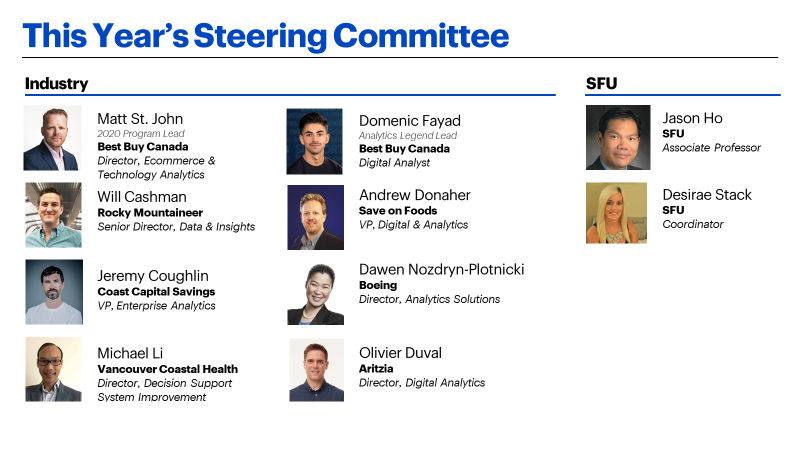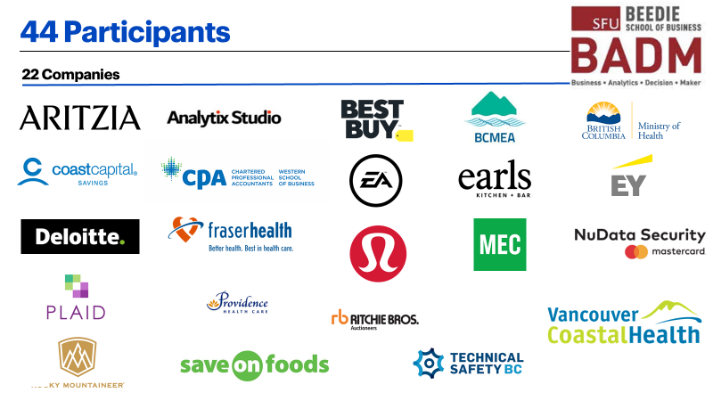Image: Data Space from Wigzo
Celebrating Analytics in 2020
Most data & analytics pros can relate to the habitual routine of reaching for some trusty headphones and a go-to Spotify playlist in preparation for an analysis. The deeper the analysis, the deeper the focus.
We like to dive deep, so deep sometimes that lunch happens at dinner time. And sometimes its eggs for lunch, which means eggs for dinner.
Analysts need to dive deep to understand the problem. In the same way that a doctor takes time to properly diagnose their patients, analysts must carefully diagnose the business problem. Performing open-heart surgery on a broken ankle is probably not going to help anything.
The ability to zoom in is clearly important, but so is the ability to zoom out. Analysts need to recognize what the bigger picture looks like in order to inform the best possible decision.
You might ask, how does an analyst acquire this skill?
The answer is simple: by chatting with you!
That’s right, you, dear analyst. Analytics professionals need the perspective and knowledge sharing that comes from learning about the experience of their peers.
Hello, World!
I’m a Data Analyst at Best Buy Canada, and at the time of writing this post, I worked on the product technology teams that helps you get your products.
Within our analytics community of practice, one of the most important themes this year has been staying connected with people. For me, this has meant a combination of 1:1 virtual meetings and informal group chats with some folks that, in a pre-pandemic world, I would have visited at their desks.
Seeking human connection with my peers, not some transactional relationship that is bound to expire. It is also a phenomenal excuse to set up online board games on a late Friday afternoon to get the social and creative juices flowing.
Building authentic connection isn’t hard, it just takes a little sweat equity. And that is why hackathons and industry forum are so powerful.
One event that is truly excellent at empowering analytics folks to connect and learn from one another is the SFU BADM Hackathon & Industry Forum. It has provided a platform for developing a strong community of analytics leaders here in Vancouver since 2016.
The SFU Business Analytics & Decisions (BADM) Hackathon
In 2016, Professors Robert Krider and Jason Ho at the SFU Beedie School of Business launched the first-ever Business Analytics and Decision-Making (BADM) Hackathon for students.
With the support of analytics pioneers in Vancouver that formed the steering committee, an annual event including an industry forum was born.
Several years later and the purpose of these forums remains the same: discuss best practices, experiences, lessons learned, and assist in the accelerated growth of analytics in the Greater Vancouver Area.

The 2020 Industry Forum Topics and Format
44 analytics leaders from some of the top companies in Vancouver joined us virtually for the annual SFU BADM Vancouver Analytics Industry Forum.

The first half of the event included three case study presentations followed by round-table discussions:
- Solving the analytics talent gap in Vancouver
- Storytelling with data
- Building a self-serve data culture
Its in these break-out sessions where these valuable human connections are made. In this article, I will be discussing the key takeaways that came from each individual group discussion.
The second half of the event featured a new competition to come together and celebrate the six of the most exciting analytics initiatives happening in Vancouver this year and the crowning of a champion. There will be a second article published in the next week all about this competition.
Topic 1: Solving the Analytics Talent Gap in Vancouver
I joined Best Buy’s Digital Intelligence team as an intern Digital Analyst in the spring of 2018. I appreciated how the team never treated me as an intern. Instead of building PPT decks all day long, I was encouraged to chase business problems and expected to add value. It is one of the main reasons I decided to come back after my University program at SFU.
Finding and retaining analytics talent is not easy. Data & Analytics focused university programs - like the SFU BADM, SFU Masters in Big Data, UBC MBAN, UBC MDS - are creating strong pipelines of entry level talent. Still, hiring remains one of the key challenges that persist.
How can organizations navigate the tricky landscape of finding both experienced and entry level talent?
Matt St. John, Director of E-Commerce and Technology Analytics at Best Buy Canada, led the group through a lively discussion of the problems that exist with hiring analytics talent in Vancouver.
Below is a summary of the three most interesting takeaways from the analytics talent gap in Vancouver:
- Talent bottlenecks caused by misalignment of talent expectation and industry needs, impeding hiring efforts
- Attrition of talent to other roles (e.g. marketing, management, IT, etc..) and markets (East Coast, US, etc..) continues to be a challenge.
- New data & analytics roles at various levels of seniority as a result of the maturing analytics in Vancouver. The top organizations must be able to recognize talent and pair them to relatively new roles. Examples included technical product managers and analytics practice leads.
The group also discussed six actionable opportunities that exist to solve the talent gap:
- Clearly articulate career development with data and analytics professionals. Create career paths for young professionals with industry-aligned standardized job titles, descriptions, and salary bands.
- Be more specific in the job description and match them with the appropriate level of experience. For example, standardizing and communicating data science skills vs. data engineer skills may improve the matching of suitable candidates to opportunities.
- Create industrywide support and mentorship program to assist professionals as they work through their careers in Vancouver.
- Develop consistent communication and messaging across the industry to provide clarity, stability, and opportunity in the market.
- Continue to actively participate in different communities of interest where analytics practitioners can connect frequently and share opportunities.
- Take advantage of remote work to unlock the talent in other geographic areas.
Topic 2: Storytelling with Data
“Storytelling is the greatest technology that humans have ever created.”
Jon Westenberg
These days, everyone who knows how to use EXCEL and PowerPoint can call themselves a storyteller. But there is more to storytelling than cool visualizations.
Before breaking into our discussion groups, Jeremy Coughlin, VP of Enterprise Analytics from Coast Capital Savings, summarized his four key takeaways to improve your storytelling skills:
- Be authentic. Let your own personality shine through.
- Get to the point. Keep it simple: tell people what you are going to tell them, tell them, then summarize.
- Drive action. Actionable insights will always defeat fun facts.
- Know your audience, and the context. The message is more important than the medium - tailor your presentation accordingly.
Topic 3: Building a Self-Serve Data Culture
Self-serve data cultures are all about breaking down the barriers preventing data from being employed within our own organizations.
At Best Buy Canada, the analytics team has invested a lot of effort over the years to democratize data and knowledge at scale.
One recent example is the investment in Best Buy Canada’s Data University. Inspired by Airbnb’s approach to democratizing data, Best Buy’s Data University focused on bringing awareness, education, and support for all users within the company.
Whether you are an analytics pro or someone who’s new to looking at data, a self-serve data culture is one that strives to provide the access, knowledge and tools necessary to use data to guide your solution.
Organizations in Vancouver face similar hurdles in the pursuit of analytics maturity. Olivier Duval, the Director of Digital Analytics at Aritzia, led the group through his learnings of building a self-service analytics culture as summarized below:
- Self-serve analytics is a continuous journey. Requires training, support, mechanisms, and champions to support different users.
- Self-serve works better in different subsets. The organization needs to be OK with people making mistakes, and design programs to improve the overall data maturity.
- Self-serve does not have to be a free-for-all. Put appropriate governance in place and enforce a process whereby users must get their self-serve work vetted to ensure accuracy.
Celebrating Analytics in 2020 is About Building Meaningful Connections
In closing, I’d like to reflect on the importance of staying connected. Just because remote is the new normal, it does not mean we can’t start meaningful conversations with peers outside our organizations.
As mentioned earlier, it is critical for analytics leaders to build these relationships so that we can learn from one another and take these learnings into our own organizations. This is how we elevate the analytics maturity in Vancouver.
Technology exists to bring us together, and what better occasion is there to come together than to celebrate our awesome craft by way of competition.
I look forward to seeing you at a future data and analytics meetup in Vancouver. I also eagerly await what the best analytics project of 2021 will be in the next Analytics Legend of Vancouver competition…



